7 Differences Between Commercial Pools and Residential Pools


At first glance, a pool is just a sparkling body of water with steps, tiles, and maybe a diving board. But in reality, commercial swimming pools and residential pools are built with entirely different purposes in mind.
Now, it’s not mandatory to understand the main differences, but in my decades of experience as a pool builder, I have seen people being scammed for money by unethical pool builders, who proposed commercial attributes for a residential pool.
Many homeowners would hardly realize what they are paying extra for unless they consult with multiple pool builders. But often, you don’t get that chance because the first team seems so convincing.
Remember, a residential pool is a private oasis for homeowners and their families, while a commercial pool is a large-scale facility designed for public or multi-family use, with much stricter safety and maintenance requirements. So having some knowledge about them will definitely help if you are planning to get a pool built anytime soon.
As for commercial pools, you should also know if your pool builder is giving you the wrong stuff just because you negotiated a lower price.
So in this guide, I have put my experience into words so that you at least know the bare minimum before going for a large pool investment.
So let’s begin.
TL;DR: Commercial vs Residential Pools at a Glance

- You should know the main differences between commercial pools and residential pools so that you may avoid spending more or getting the wrong pool built.
- A commercial pool is a swimming pool used by multiple households or the public
- Commercial pools are used by hotels, gyms, schools, resorts, waterparks, etc.
- They are usually larger, heavily regulated, and built for durability.
- A residential pool is a private pool for a single household.
- They are smaller in scale, less regulated, and highly customizable.
- In terms of size and depth, commercial pools are much larger and deeper to handle crowds and specific uses like diving or competition.
- Commercial pools cost 2–3x more to build and maintain than backyard pools.
- Commercial swimming pools must follow strict ADA, CDC, and state safety guidelines.
- Residential pools only need local permits and fencing.
- Residential pools focus on lifestyle features like waterfalls, fire bowls, and even frameless pool windows.
- Commercial pools emphasize safety, accessibility, and capacity, though luxury resorts may also use underwater pool windows for aesthetics.
- Commercial pools require constant monitoring; residential pools need weekly upkeep.
- Always consult with pool builders who have a proven track record for your required pool type. For example, you may contact Hammerhead Pools for luxury residential pools, or any commercial pools as they have decades of experience on both..
Now let's get into the details.
What Is A Commercial Pool?
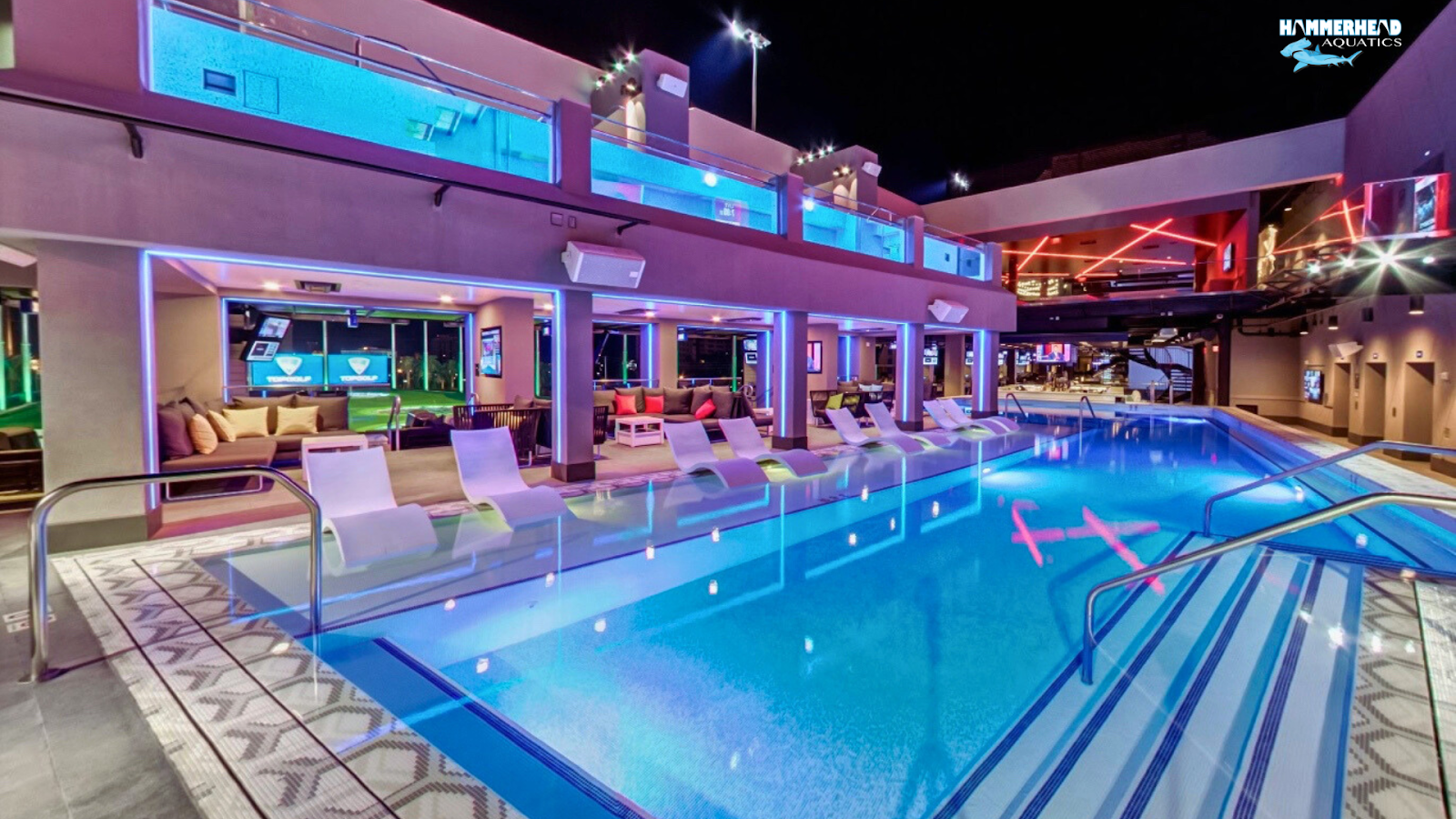
A commercial pool is any pool designed for public use or shared use by multiple households. This includes:
- Hotel and resort pools
- Fitness center and spa pools
- Community and recreational center pools
- School or university aquatic facilities
- Olympic or competition swimming pools
- Waterparks and therapy pools
If you own any of the above, then you must go for a commercial pool.
Commercial swimming pools are often large-scale, multi-functional, and built to strict codes. They must handle hundreds of swimmers daily, withstand heavy wear-and-tear, and provide features like accessibility lifts, lifeguard stands, and redundant filtration systems.
💡 Pool windows in commercial settings: Many resorts and aquatic centers now include underwater pool windows, either as viewing panels for spectators or as luxury features in infinity pools. Unlike residential installs, these require rigorous structural engineering, safety testing, and code compliance.
What Is A Residential Pool?
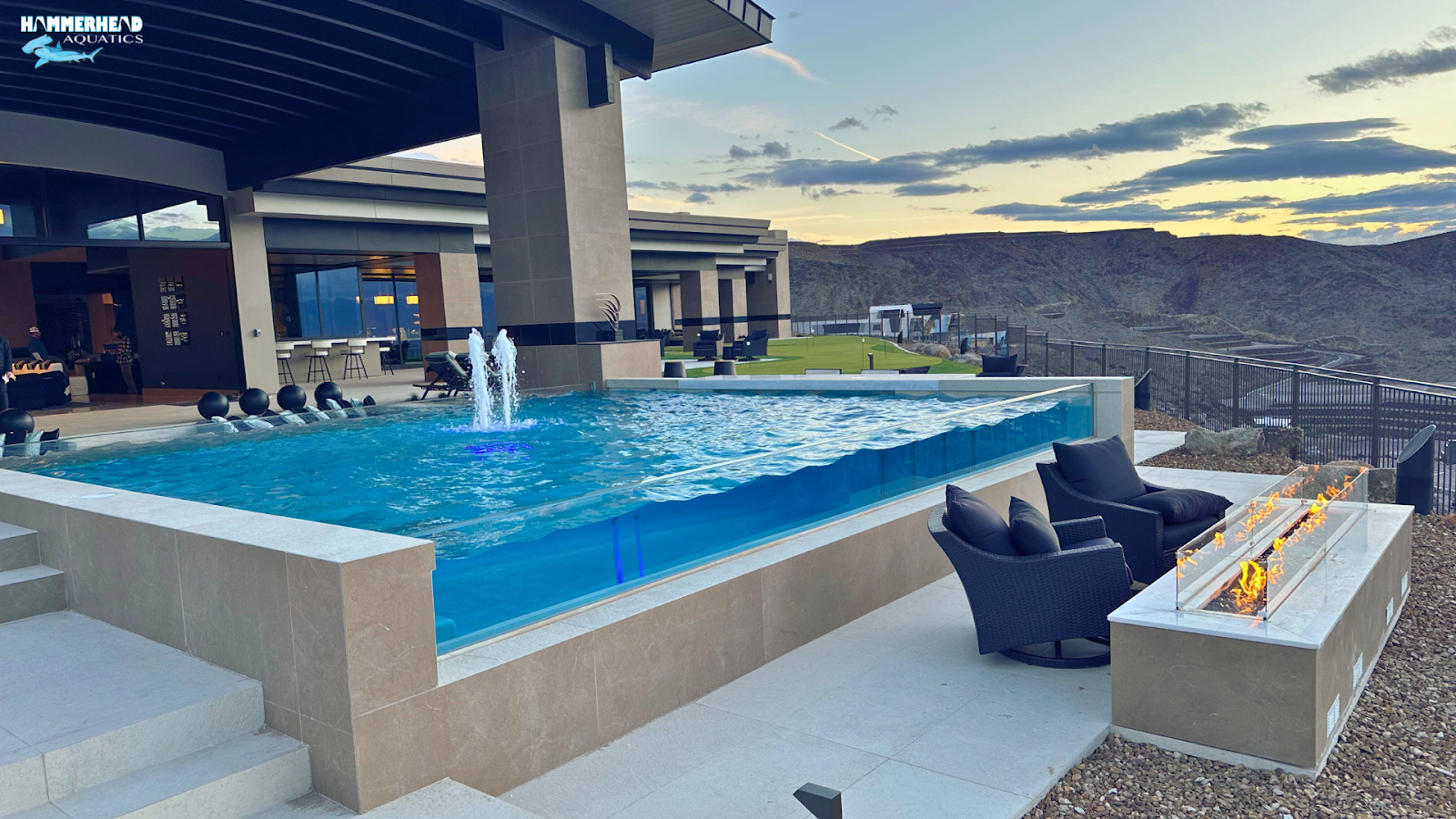
A residential pool is built for a single household’s private use. These pools typically emphasize comfort, design flexibility, and personal lifestyle choices.
- Common types: geometric pools, freeform designs, plunge pools, infinity pools, and even small “spools” (spa + pool hybrids).
- Average size: 400–1,200 sq. ft., with depths between 3 and 6 feet.
- Features: fire pits, waterfalls, tanning ledges, LED lighting, and increasingly frameless acrylic pool windows for a luxury finish.
If you want a private pool on your property, then you need a residential pool, and not a commercial one.
Unlike commercial pools, you don’t need to worry about lifeguard staffing, ADA requirements, or high-volume filtration. Instead, you can focus on aesthetics, relaxation, and property value.
Differences Between Commercial Pools And Residential Pools
Now, let’s look into some important differences between the two pool types so that you know what you should sign up for (and know if anyone is trying to rip you off with cost).
1. Purpose and Usage

Residential pools are for family leisure, fitness, and personal entertainment. They’re designed around lifestyle.
Commercial pools serve large groups of people and may support competitive sports, therapy, or tourism.
Example: A backyard pool might feature a tanning ledge and BBQ area, while a hotel pool must provide enough deck space for dozens of guests and comply with accessibility laws.
2. Size and Depth
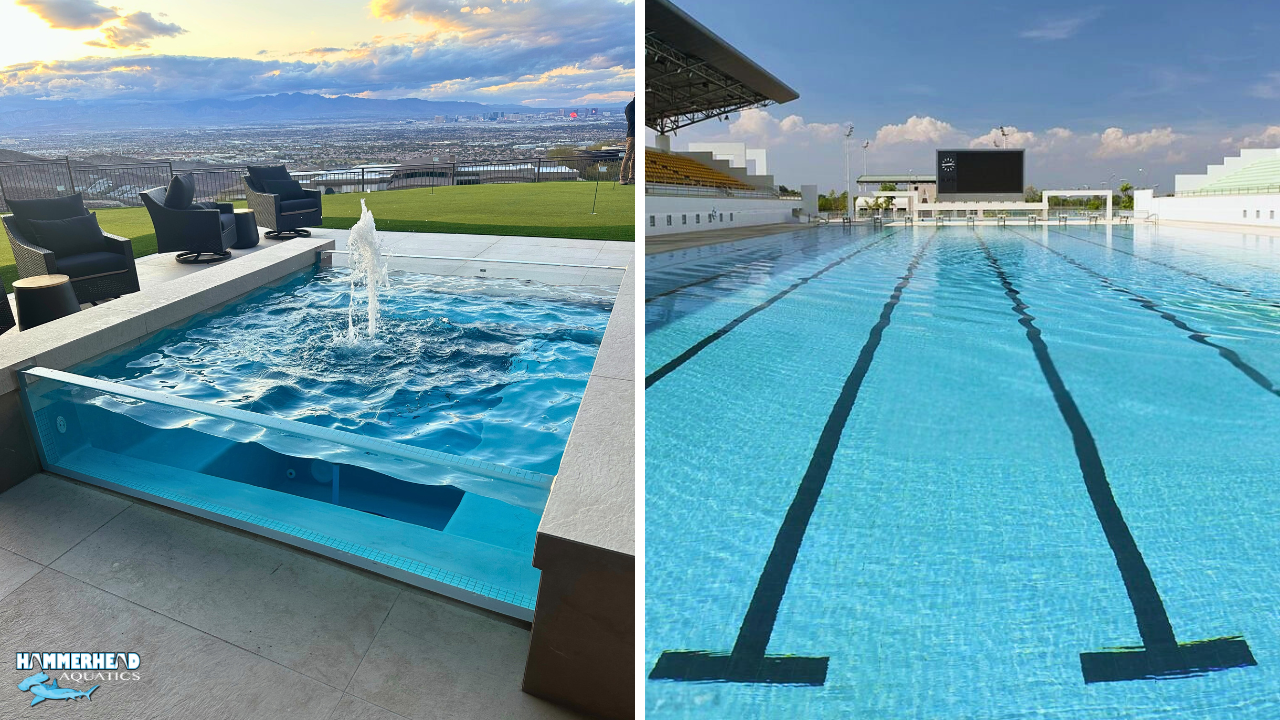
Residential pools are usually smaller, shallower, and built for convenience (often 3–6 feet deep).
Commercial pools can be much larger and often deeper. For instance, Olympic pools are 50m long and up to 17 feet deep for diving.
💡 FYI: Deeper pools (especially diving and therapy pools) are where underwater viewing windows are most often installed for safety supervision and spectator viewing.
3. Cost Differences
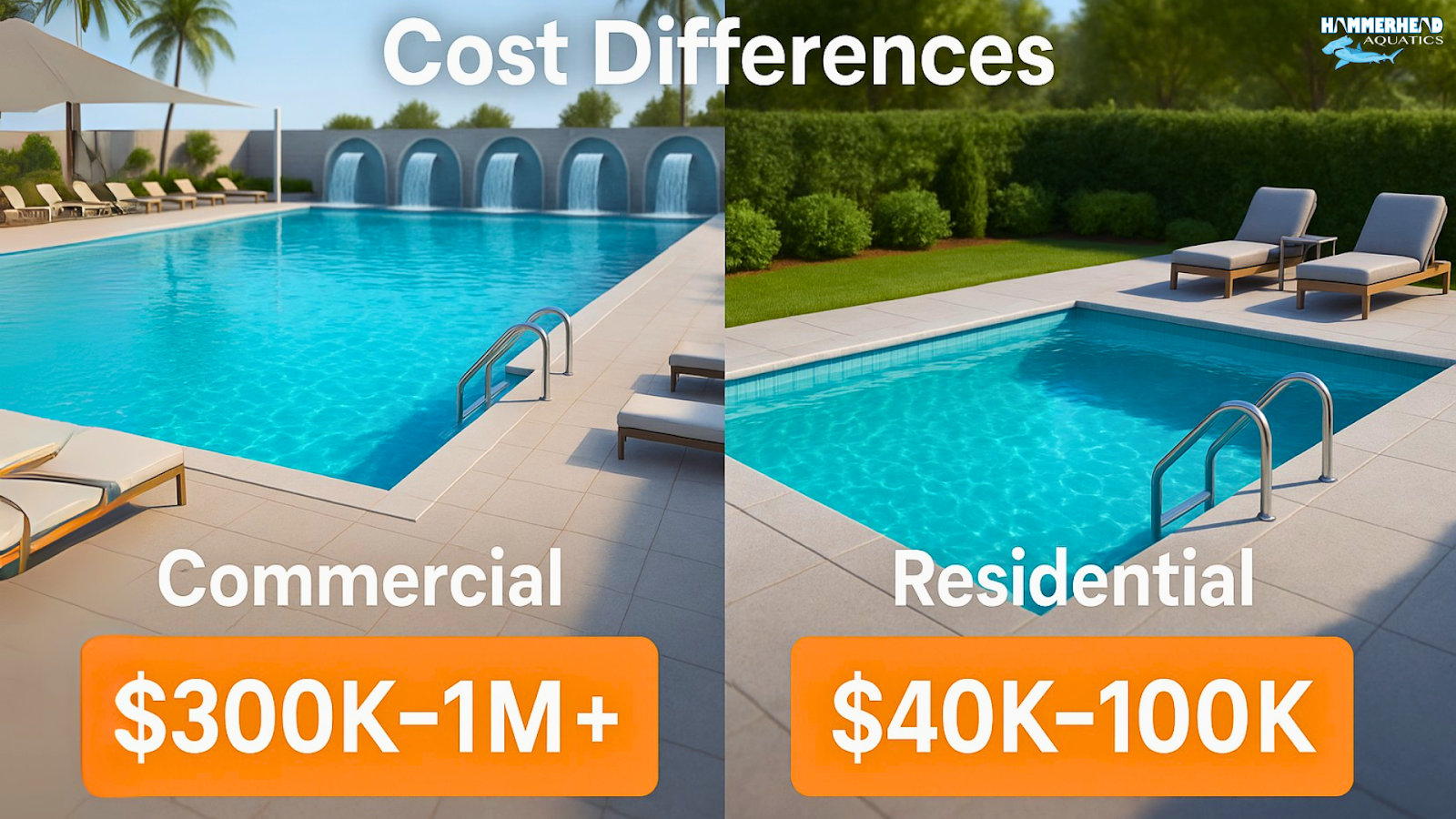
A residential pool may cost between $40,000 to $100,000, depending on the materials, shape, pool type, and if luxury features such as pool windows will be installed.
Commercial pools can get quite expensive, ranging from $300,000 to over $1 million. Features such as diving boards, larger filters, accessibility lifts, and pool windows will have a high impact on the cost.
Commercial pools also need more frequent maintenance, meaning higher costs than residential pools. However, some luxury pools can have high maintenance costs compared to regular private pools.
4. Safety Codes and Regulations
For commercial pools, it is mandatory to comply with CDC, ADA, state, and municipal regulations, covering:
- Handicap accessibility
- Lifeguard requirements
- Emergency exits and equipment
- Advanced circulation and disinfection systems
On the other hand, residential pools simply require local pool building codes such as fencing, alarms, and residential permits.
5. Construction Process
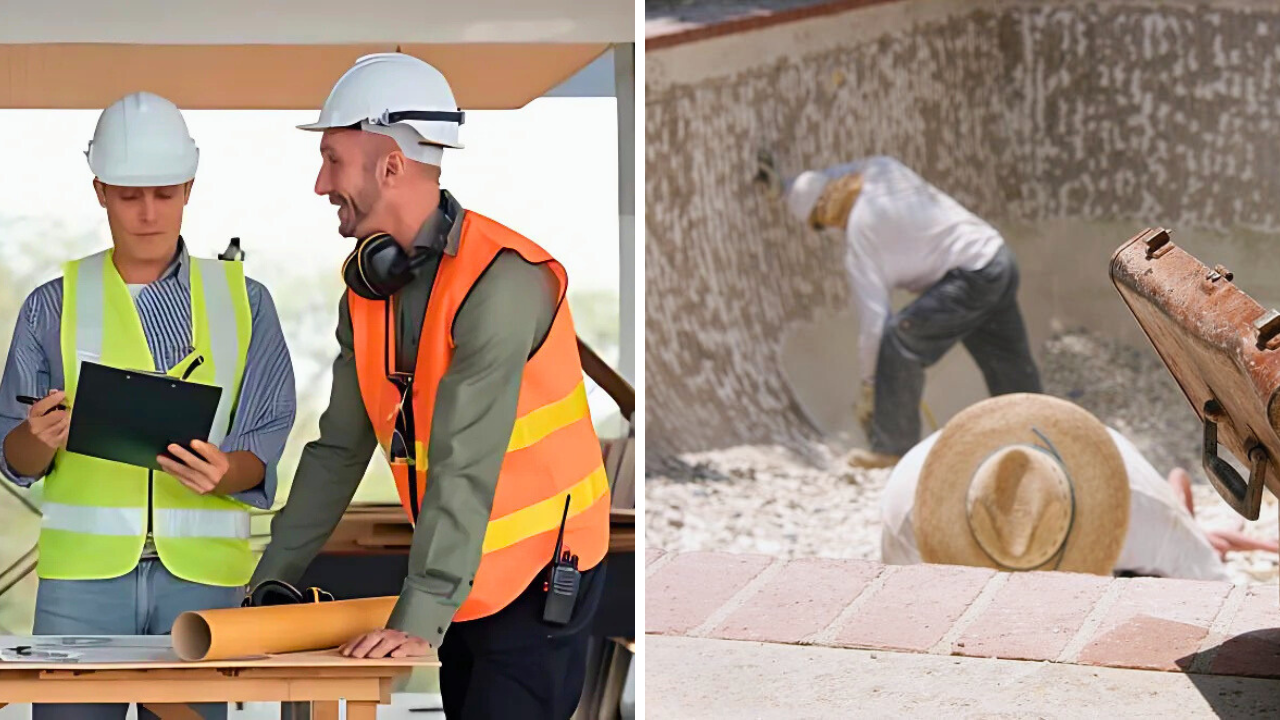
Commercial pools can easily take over a year to build as they require highly skilled engineers and architects to ensure the highest precision, while conducting multiple quality inspections.
Residential pools can be built in just a few weeks. Luxury swimming pools may take a couple of months or more in most cases, depending on complexity.
FYI: Installing pool windows in a commercial pool involves far more technical work. Calculating water load, using laminated or acrylic panels, and passing structural safety tests can be challenging, and you should only use pool experts with over 10 years of experience (for example, Hammerhead Pools is a prime pool builder you can trust).
6. Appearance and Design
When building commercial pools, it’s important to prioritize function and safety. Luxury resorts invest heavily in spectacular designs with underwater windows to stand out.But precision in engineering is necessary to be able to withstand the high pressure of water and the large number of swimmers.
With residential pools, you should focus on luxury and lifestyle. Consider getting fire bowls, waterfalls, infinity edges, and frameless pool windows for the best output. Or, you can simply want a simple pool for the family within budget.
7. Maintenance and Lifespan
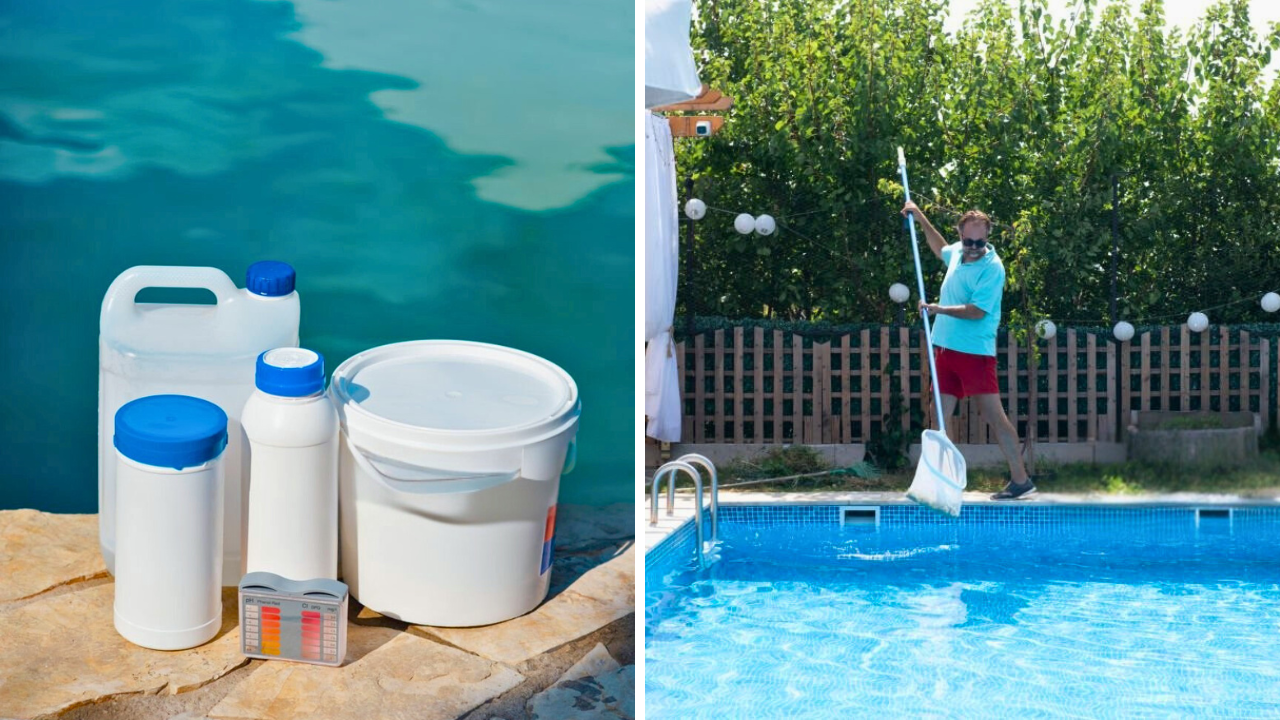
For commercial pools, you need to conduct water testing every few hours to avoid losing quality and negatively affecting swimmers. You will need a full-time staff and industrial-grade filtration.
Residential pools may require weekly cleaning and seasonal opening/closing. So you wouldn’t have to worry much about breaking your bank for maintenance. But you should still learn the basic maintenance procedures to ensure your swimming pool has higher longevity. (Here’s a quick guide to learn how to maintain your pool properly.)
Tip: Heavy use shortens the lifespan of commercial surfaces and equipment compared to residential pools.
Quick Comparison Table: Commercial Pools vs Residential Pools
- Definition
- Commercial Pools: Pools for public or shared use (hotels, gyms, resorts, schools, waterparks).
- Residential Pools: Private pools for a single household.
- Commercial Pools: Pools for public or shared use (hotels, gyms, resorts, schools, waterparks).
- Size & Depth
- Commercial Pools: Large-scale, often Olympic-sized or deep (up to 17 ft).
- Residential Pools: Smaller, 400–1,200 sq. ft., 3–6 ft deep.
- Commercial Pools: Large-scale, often Olympic-sized or deep (up to 17 ft).
- Cost
- Commercial Pools: $300,000 – $1M+ build, high ongoing maintenance.
- Residential Pools: $40,000 – $100,000 build, moderate upkeep.
- Commercial Pools: $300,000 – $1M+ build, high ongoing maintenance.
- Safety & Codes
- Commercial Pools: Strict CDC, ADA, and municipal compliance.
- Residential Pools: Local building codes (permits, fencing, alarms).
- Commercial Pools: Strict CDC, ADA, and municipal compliance.
- Construction Timeline
- Commercial Pools: Months to a year+; requires engineers & inspections.
- Residential Pools: Weeks to months; simpler build process.
- Commercial Pools: Months to a year+; requires engineers & inspections.
- Design Priorities
- Commercial Pools: Safety, accessibility, crowd handling; luxury resorts may add underwater windows.
- Residential Pools: Lifestyle, aesthetics, customization (fire pits, infinity edges, acrylic pool windows).
- Commercial Pools: Safety, accessibility, crowd handling; luxury resorts may add underwater windows.
- Maintenance
- Commercial Pools: Constant water testing, full-time staff, heavy-duty filtration.
- Residential Pools: Weekly maintenance, seasonal prep.
- Commercial Pools: Constant water testing, full-time staff, heavy-duty filtration.
- Use Cases
- Commercial Pools: Competition, recreation, therapy, resort entertainment.
- Residential Pools: Family leisure, relaxation, and personal fitness.
- Commercial Pools: Competition, recreation, therapy, resort entertainment.
- Installing Pool Windows
- Commercial Pools: Often used in diving pools, resorts, and aquatic centers with strict engineering.
- Residential Pools: Increasingly popular in luxury home pools for a modern look.
- Commercial Pools: Often used in diving pools, resorts, and aquatic centers with strict engineering.
Final Thoughts: Commercial vs Residential Pools
The main differences between commercial swimming pools and residential pools come down to scale, cost, safety, and purpose.
If you’re planning a backyard oasis, you’ll have more freedom with design and features like infinity edges or pool windows. But if you’re designing a commercial facility, compliance and engineering standards are paramount.
Either way, the addition of pool windows, whether for luxury, supervision, or architectural impact, is one of the most effective ways to elevate your pool design.
Expert Pool Window Design & Installation
If you’re working on a project involving luxury pools or commercial pools for resorts, then you may contact the Hammerhead Pools team.
With over two decades of experience, we’ve delivered successful installs in everything from Market Square Tower Sky Pool and Anaha Tower Pool to high-profile rooftop pools.
While we’re known for tackling complex, high-end projects, our goal is always to provide real value, not unnecessary cost. Book a call with us, share what you’re envisioning, and we’ll happily offer a free quote or practical alternatives that fit your budget and goals. (Contact Us)
Even if you’re just exploring ideas, we can help you figure out:
- Whether a pool window fits your design and location
- Which material, works best for your climate and style
- How large or small your window can safely be
Feel free to leave a comment below or send us a message. We’ll get back to you with clear, experience-based advice to help you plan smarter.
FAQs: Commercial Pools vs Residential Pools
1. What is a commercial pool?
A pool designed for public or multi-household use — such as hotels, gyms, schools, resorts, or waterparks.
2. What is a residential pool?
A private pool for one household, usually smaller and more customizable.
3. Why are commercial pools more expensive?
They require larger filtration systems, ADA compliance, safety features, and must withstand heavy daily use.
4. Do commercial pools have pool windows?
Yes — especially in resorts, aquatic centers, and diving pools. These are engineered with strict safety standards.
5. Can a residential pool have a pool window?
Absolutely. Many homeowners are adding acrylic or glass pool windows for aesthetics, visibility, and luxury appeal.
6. Which type of pool is easier to maintain?
Residential pools are much easier. Commercial pools require constant monitoring and professional staff.
Whether you’re building a private residential pool or a large commercial facility, understanding these differences can save you from costly mistakes and scams. Residential pools offer more creative freedom and lifestyle features, while commercial pools demand engineering precision and regulatory compliance. At Hammerhead Pools, we specialize in both, delivering luxury backyard designs and large-scale commercial projects with equal expertise. Contact us today to discuss your project and get a tailored plan that balances safety, function, and design.











